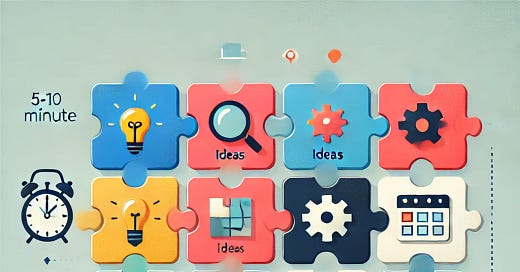The Future of Learning for ADHD Minds: Personalized, Interactive and Bite-Sized.
The trend towards microlearning - breaking training into 5-10 minute chunks - is perfect for keeping our attention and helping us absorb information.
As someone with ADHD, traditional classroom learning has always been a challenge for me. Sitting still for hours, trying to pay attention to long lectures and PowerPoint presentations was painful. My mind would constantly wander and I'd miss key information.
But the world of corporate learning and development is finally starting to change in ways that will make it much more effective and engaging for those of us with ADHD brains. The future of workplace training is personalized, interactive, and delivered in small, digestible chunks - perfectly suited for how we learn best.
One-size-fits-all training is becoming a thing of the past. Smart companies are realizing that everyone has different learning needs, goals and career paths. By leveraging technology, training can now adapt to the individual. Imagine mini online lessons and exercises recommended just for you based on your role, experience level and interests. No more slogging through boring, irrelevant content. L&D will be like Netflix - serving up bite-sized content it knows you'll find useful and enjoy.
For ADHDers, short and highly focused works best. We struggle with long content and tasks. The trend towards microlearning - breaking training into 5-10 minute chunks - is perfect for keeping our attention and helping us absorb information. These mini-modules can fit easily into our day, like listening to a podcast on our commute or doing a quick exercise between meetings. Learning becomes integrated into the workday instead of an annoying disruption.
Interactivity is also key. ADHDer minds crave novelty, so traditional lecture-based training is pure torture. The more learning simulates a game or involves interaction with others, the more we will engage. I'm excited about virtual and augmented reality training experiences. Imagine practicing public speaking in a VR environment that feels real but is totally safe to mess up in. Or learning a technical skill via an AR overlay that guides you through it step-by-step. Way more fun than Death by PowerPoint!
Ultimately, I hope the future of learning embraces the strengths of the ADHD mind instead of trying to force us to conform to neurotypical ideals. We are creative, out-of-the-box thinkers. Let us move around, collaborate with others, and learn by doing. I envision flexible training that lets the learner choose their own path and includes options like walking meetings with audio lessons or group discussions in chatrooms to harness our energy.
At the same time, training needs to help us develop key skills to manage our unique challenges. I would love to see mini-courses on topics like improving focus, prioritizing tasks and communicating clearly - all delivered in ADHD-friendly formats of course! We may have to work a little harder in some areas, but targeted support could make a huge difference.
The corporate learning world is finally catching up to what ADHD employees have always needed to thrive. As training becomes more personalized, bite-sized and interactive, we will waste less time and energy trying to force ourselves to focus and remember. We'll be able to harness our curiosity and learn in ways that feel natural and fun.
So companies, take note - the future of learning is ADHD-friendly! Ditch the full-day seminars and hundred-slide PowerPoints. Embrace the short, modular and adaptive. Not only will ADHD employees like me greatly appreciate it, but the entire workforce will likely be more engaged and better prepared for the constant learning required in today's fast-paced world. Let's design learning fit for the ADHD mind, and usher in a more effective era of career development for all.




I’ve seen two-hour long training sessions and my heart sinks, let alone longer than that. Will be interesting to see how the corporate world takes to running such bitesize learning sessions. The doable-ness of 10 minutes is undeniable (and I wrote a book on it, The 1% Wellness Experiment!).